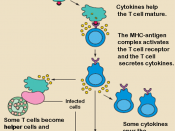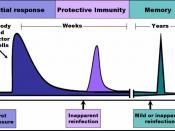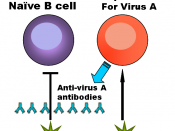Pretty Thorough Summery of the Article -
'Article Summery'
Name: 'Immunity and the Invertebrates'
Periodical: Scientific American Nov, 1996
Author: Gregory Beck and Gail S. Habicht
Pages: 60 - 71
Total Pages Read: 9
The complex immune systems of humans and other mammals evolved over quite a long time - in some rather surprising ways. In 1982 a Russian zoologist named Elie Metchnikoff noticed a unique property of starfish larva. When he inserted a foreign object through it's membrane, tiny cells would try to ingest the invader through the process of phagocytosis. It was already known that phagocytosis occurred in specialized mammal cells but never in something less complex like a starfish. This discovery led him to understand that phagocytosis played a much broader role, it was a fundamental mechanism of protection in the animal kingdom. Metchnikoff's further studies showed that the host defense system of all animals today were present millions of years before when hey were just beginning to evolve.
His studies opened up the new field of comparative immunology. Comparative immunologists studied the immune defenses of past and current creatures. They gained further insight into how immunity works.
The most basic requirement of an immune system is to distinguish between one's own cells and 'non-self' cells. The second job is to eliminate the non-self cells. When a foreign object enters the body, several things happen. Blood stops flowing, the immunity system begins to eliminate unwanted microbes with phagocytic white blood cells. This defensive mechanism is possessed by all animals with an innate system of immunity. Innate cellular immunity is believed to be the earliest form of immunity. Another form of innate immunity is complement, composed of 30 different proteins of the blood.
If these mechanisms do not work to defeat an invader, vertebrates rely on another response:...


